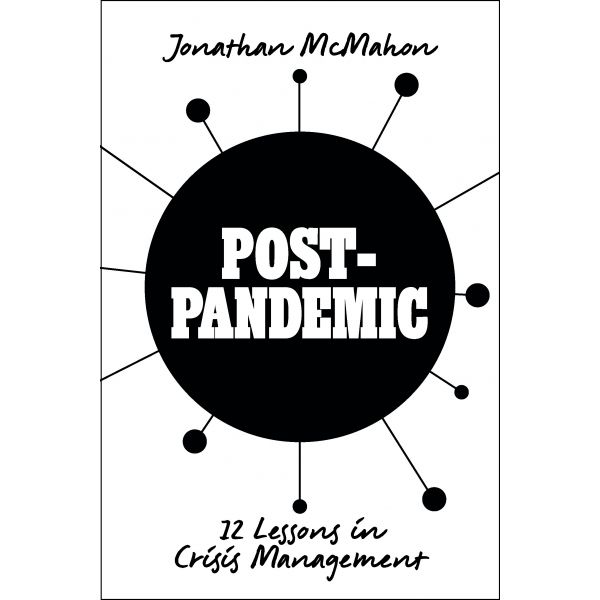Post-Pandemic: 12 Lessons in Crisis Management, by Jonathan McMahon
‘… a magnificent book. McMahon brings his policy experience … to give us key lessons of looking at the data, making judgements, and acting quickly before the problems become unmanageable.’ – Ashoka Mody
The world economy had barely recovered from the global financial crisis when the COVID-19 pandemic struck and knocked it back to the floor. Governments already struggling with low growth and high debt have, once again, been forced to take extraordinary measures to protect businesses and jobs. The future looks grim.
The pandemic swept across the globe in 2020 as quickly as confidence in the banking system had vanished in 2008. In Ireland, only the tough decisions of a small group of regulators and officials kept the country from collapse, though the price of salvation was a huge national debt and years of lost opportunities.
As a key insider to the Irish bailout, Jonathan McMahon was at the heart of the response, witnessing what it takes to manage a crisis that threatens a nation. Battle-hardened by his experiences at the top of UK financial regulation during the terrorist attacks of September 11, 2001, Jonathan’s advice on how to deal with crises is invaluable as countries grapple with the effects of COVID-19.
Jonathan does not have all the answers, but as Henry David Thoreau said, ‘It's not what you look at that matters, it's what you see’. Jonathan argues that we have to attend to the real, underlying causes of crises, not expediently dodge the difficult choices to be made. The bitter truth is that even if a vaccine is found to eradicate the virus, the huge challenges facing political and business leaders will persist.
Post-Pandemic is essential reading as we make decisions about our future. It is a book for our times.
‘… a magnificent book. McMahon brings his policy experience … to give us key lessons of looking at the data, making judgements, and acting quickly before the problems become unmanageable. … [W]ritten in a fun, racy style … in the post-pandemic world of pervasive uncertainty, it carries profound messages.’ – Ashoka Mody, Visiting Professor in International Economic Policy at Princeton University, former Assistant Director with the International Monetary Fund and author of EuroTragedy: A Drama in Nine Acts
‘Can our reactions to the previous crisis help us navigate the post-pandemic economic recovery? Drawing on a shrewd interpretation of his experience in Ireland a decade ago, and illustrating the discussion with vivid cameos, Jonathan McMahon makes a persuasive case that they can. A lively and instructive read.’ – Professor Patrick Honohan, former Governor of the Central Bank of Ireland and author of Currency, Credit and Crisis: Central Banking in Ireland and Europe.
‘The Covid 19 pandemic has produced an economic crisis which, as usual, is quite unlike its predecessors. But Jonathan McMahon shows that there are some enduring principles which should govern crisis management. He has drawn on his experience in the eye of the storm in the euro zone banking crisis to write an entertaining and extremely useful book.’ – Sir Howard Davies, Chairman of the Royal Bank of Scotland and former Director of the London School of Economics.
About the Author
Jonathan McMahon is a Director and Co-Founder of Green Arbour, a strategic advisory consultancy, and a Trustee and Board Member at National Star, a charity which supports young people with special educational needs. He recently stepped-down as Joint-Chief Operating Officer at St. James’s Place Plc., where he was also Chief Risk Officer until 2016. He started his career as Sir Howard Davies’s Private Secretary at the Financial Services Authority in the UK, where he had a ringside seat to the financial effects of the 9/11 terrorist attacks. In his early 30s, he worked as a Director at the Central Bank of Ireland where he played a leading role in the work to rebuild the economy following the global financial crisis. He was educated at St. Andrews University, The College of William & Mary in Virginia, London Business School and IMD in Lausanne.
| Author | McMahon, Jonathan |
|---|---|
| Print Format | Paperback |
| ISBN-13 | 9871916099876 |
| Date of Publication | August 24, 2020 |
| Number of Pages | 272 |



